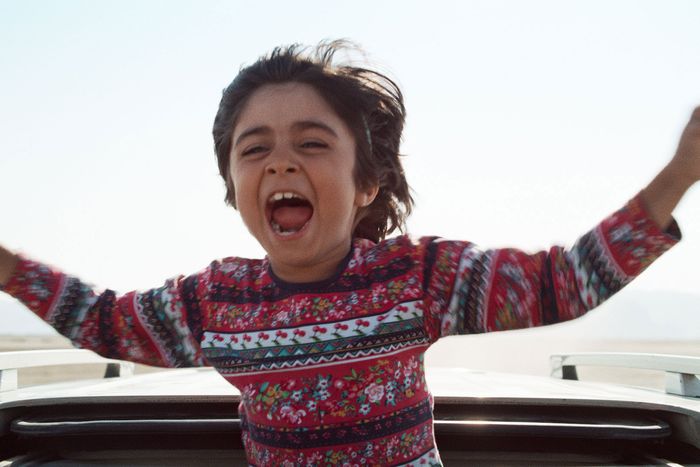
“Where are we?” “We’re dead,” is an early, indicative exchange between mother and son in the surprisingly funny and ultimately defiant Hit the Road, the feature debut from Iranian writer and director Panah Panahi. Panahi’s father, Jafar, is an icon of the Iranian New Wave who, despite being banned in 2010 from making films in Iran and from leaving the country for 20 years, has continued to create clandestine art like 2011’s sly This Is Not a Film. That same sense of rebellion seems to inspire Panah, too, who in Hit the Road veils his pointed criticisms of Iran’s domestic policies with the discussions and disagreements of a family on a mysterious road trip. There is love between each member, who mostly remain unnamed — they are a father (Hassan Madjooni), a mother (Pantea Panahiha), and two sons, one of them a 20-something (Amin Siminar) and the other a 6-year-old (Rayan Sarlak). But there is an encroaching sense of despair among them, too, and the balance Panahi finds in Hit the Road is enveloping and devastating.
Hit the Road doles out information slowly, deliberately, and not too dissimilarly from an Asghar Farhadi script, with lengthy conversations about philosophy and morality nestled alongside brief, suggestive lines of dialogue about the family’s political or social opinions. When the film begins, the family is pulled over on the road for a break, with each member lost in their own world — the parents napping, the older son gazing at the mountains in the distance, the younger son playing with his father’s leg cast. Panahi and cinematographer Amin Jafari (who previously worked together on 2018’s 3 Faces) set their camera inside the car, and through economical, confident pans and transitions between foreground and background, capture the fault lines dividing up this family. They sit in their self-imposed silence until the words “We’re dead” ratchet up the tension, and off we go.
There are no literal ghosts in Hit the Road, but figurative ones are everywhere. Whatever specter has inspired this road trip to Iran’s countryside, during which the boys’ mother worries they’re being followed, the older son silently cries, and the father and younger son spar in the back, the family’s bickering becomes a vulgar, sarcastic, and amusing distraction of its own. Their dog, Jessy, whom Madjooni’s character swore he saw euthanized at the veterinarian’s office, returned to their home the next day and has accompanied them on the trip. As the family drives along, other travelers emerge from the fog enveloping Iran’s verdant mountains and then disappear back into it, leaving only the putt-putt sound of their motorcycles or the smoke of their campfires behind. In certain scenes, Panahi holds a shot of a character sitting alone in silence but overlays audio from off-screen characters engaged in separate conversations, an oppositional approach that is simultaneously distracting and grounding. Life halts for some and continues for others, and who are we to say which is worthy? What gives us, or anyone, that right?
To give away too much would spoil the secret at the core of Hit the Road, which the film delicately ignores for the first half or so of its 94 minutes. Wide landscape shots bring to mind the work of Iranian cinema titan Abbas Kiarostami, while inside the cramped SUV, time passes via claustrophobic intimacy. The narrative churns forward through the family’s complicated dynamics — varyingly affectionate, jagged, overprotective, and resentful — as their practiced air of normalcy crumbles away. And although each actor gets a standout scene of their own, Madjooni and Sarlak are particularly excellent during a sequence that mixes experimental visuals (a spin on the intergalactic exploration of 2001: A Space Odyssey) with a lengthy, silly conversation between sardonic father and anarchic son about how much money Batman spends maintaining the Batmobile. It’s a high/low moment evoking such a range of genuine emotions that you’ll be sure Hit the Road has nowhere left to go, until Panahiha grabs the film’s concluding act and stamps her character’s own fury and anguish upon it.
There is a sparseness to Hit the Road that reveals the intuitiveness of Panahi’s filmmaking, his grasp of these characters and how they tug and poke at each other, and his understanding of the ways fear, paranoia, and loss turn us into people we might not like, let alone recognize. Given all that success, one of Hit the Road’s only missteps is its overly manipulative use of Payman Yazdanian’s piano score, which never feels quite right in a film that is otherwise so self-assured (especially as it cycles through pre-Iranian Revolution pop classics for the family to sing along to). In Farsi, the film’s title is Jadde Khaki, which literally translates to “dirt road” — a thoroughfare open to travelers, but earthy, raw, and unfinished. The choice to travel upon it can be an act of trespass or transformation, and Hit the Road honors the irreversibility of both.
More From This Series
- The Accountant 2 Can Not Be Taken Seriously
- Another Simple Favor Is So Fun, Until It Gets So Dumb
- Errol Morris Has Been Sucked Into the Gaping Maw of True Crime



